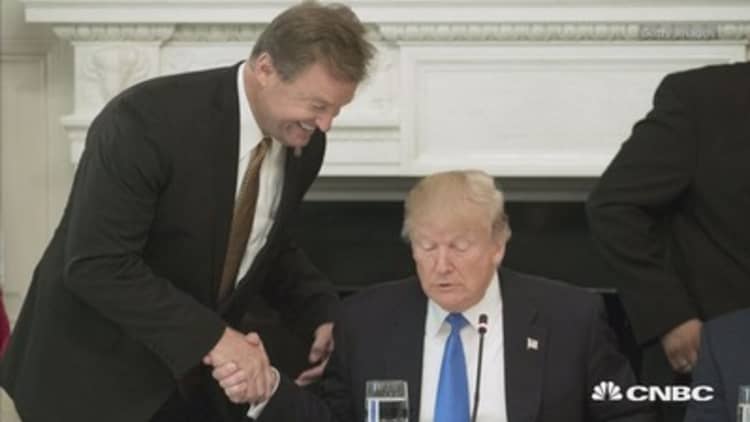
A GOP candidate challenging the Senate's most vulnerable Republican has decided to seek a House seat instead after a nudge from President Donald Trump.
Businessman Danny Tarkanian will now run for Nevada's 3rd Congressional District rather than challenge Sen. Dean Heller, R-Nev. In a statement Friday, Tarkanian said Trump and "members of his political team" contacted him Wednesday and asked him to run for the House seat he narrowly lost in 2016. The president, as well as his digital guru and 2020 campaign manager Brad Parscale, reached out to Tarkanian.
"I am confident I would have won the US Senate race and done a great job representing the people of Nevada in the Senate, but the President is adamant that a unified Republican ticket in Nevada is the best direction for the America First movement," he said in the statement. "With President Trump's full support and endorsement, I am filing to run again in CD3 with the firm belief that we will finish what we started in 2016 and win in 2018."

In a tweet earlier Friday, the president pushed Tarkanian to abandon the Senate race. Trump said "it would be great" for the Republican Party and its unity if Heller "could run for Senate unopposed."
Many observers consider Heller, 57, the Republican running for re-election this year the most likely to lose his seat. A bitter primary battle, or a Tarkanian win, could have left the seat even more vulnerable.
Tarkanian is considered more conservative than Heller and may have had a tougher time winning statewide in Nevada, which Democrat Hillary Clinton carried by about 2 percentage points in 2016. A primary election could have pulled Heller to the right on some issues, making it tougher for him to win in Nevada as a moderate.
Last year, Heller drew ire from both the left and right. He notably opposed Trump and Republican leaders' efforts to repeal and replace the Affordable Care Act. He then signed on to one of the plans GOP senators floated to overhaul the U.S. health-care system.
Tarkanian, 56, is a son of late University of Nevada, Las Vegas, basketball coach Jerry Tarkanian. In his 2016 congressional bid, he lost to Democratic Rep. Jacky Rosen, the likely Democratic candidate in this year's Senate race.
In 2016, Rosen beat Tarkanian for the 3rd District seat by just 1 percentage point. Observers consider it a toss-up and a pickup opportunity for the GOP as Rosen runs for Senate.
Tarkanian joins a crowded Republican field that includes state Sen. Scott Hammond and former state assemblywoman Victoria Seaman. Meanwhile, the campaign arm of House Democrats has backed philanthropist Susie Lee among the Democratic candidates running for the seat.
As a Senate candidate, Tarkanian cast himself as an alternative to mainstream Republicans who would better support Trump's agenda in Washington than Heller has. Polling in the GOP Senate primary was scarce, but one JMC Analytics survey in October found registered Nevada voters preferred Tarkanian by a 6 percentage-point margin. The GOP primary will take place in June.
Trump's move to nudge Tarkanian out of the race shows Republicans may have had concerns about Heller's ability to win the primary. The GOP got burned by an upstart Republican last year, when ex-Judge Roy Moore beat party leaders' preferred candidate, Luther Strange, in an Alabama Senate special election primary. Moore went on to lose the Senate seat in the deep-red state to Democratic Sen. Doug Jones.
Republicans currently hold 51 of 100 Senate seats. They aim to maintain that majority in November.
Democrats have held a consistent edge recently in polls gauging whether voters support a generic Republican or a generic Democrat in November. But the minority party has to defend about three times as many seats as the GOP does, including some in red states Trump won in 2016.
Nonpartisan election analysis websites Cook Political Report and Sabato's Crystal Ball both rate the Nevada race as a "toss-up."


